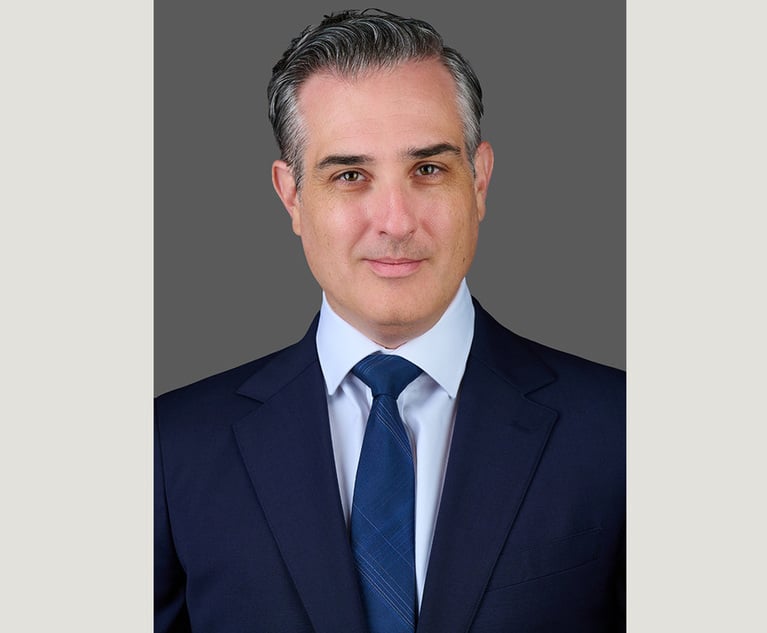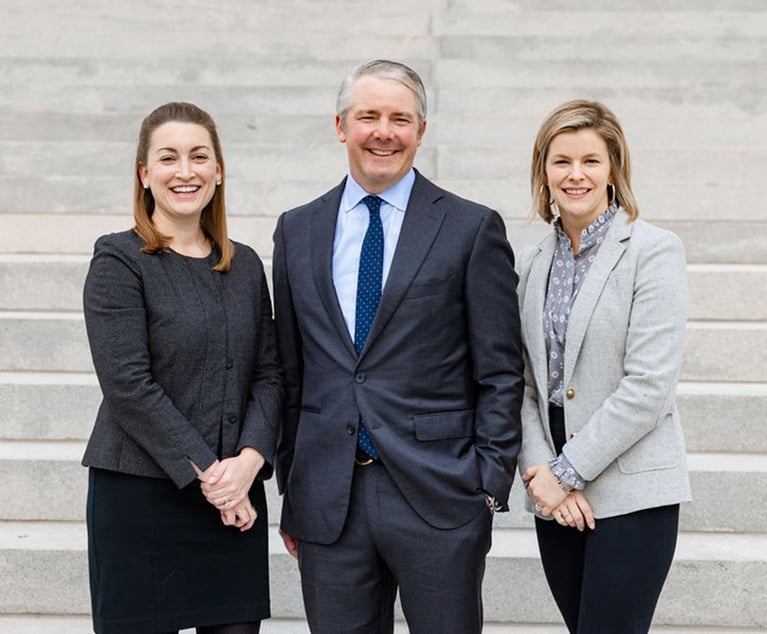Pa. House Committee to Vote on Modernizing Liquor Licensing
The Pennsylvania House of Representatives' Liquor Control Committee is set to vote on a measure to lift liquor licensing restrictions that have been in place since the repeal of Prohibition.
November 13, 2017 at 02:59 PM
6 minute read

The Pennsylvania House of Representatives' Liquor Control Committee is set to vote on a measure to lift liquor licensing restrictions that have been in place since the repeal of Prohibition.
On Tuesday, the committee is expected to pass amendments to the Liquor Code in HB 1902, a measure introduced by the committee chairman, Rep. Adam Harris, R-Juniata. If passed by the General Assembly, the bill would end the state's practice of “interlocking prohibition,” a form of tied-house law that disallows holders of liquor manufacturing licenses from also holding retail bar and restaurant licenses.
Tied-house laws make it illegal for a manufacturer to induce a retailer to sell only one brand of liquor. Lawmakers said the current letter of Pennsylvania law presents modern-day problems. For example, under the law, a landlord with a license to serve alcohol couldn't lease space to a manufacturer of alcohol.
“Throughout the nation, a three-tier system is utilized that prohibits economic relationships between producers of alcohol and distributors of alcohol. This system was put in place to eliminate issues that arose following Prohibition,” Harris wrote in the bill's memorandum. “Our liquor code has these protections by providing that no one may have an interest in more than one class of license. While this language is a necessity, certain components of how the law was drafted are no longer relevant in the 21st century.”
The committee's executive director, Shauna Boscaccy, said that the law as it stood for over 80 years didn't become a problem for businesses in Pennsylvania until the last five years with the explosion of brew-pubs.
“In this day and age it's such an unnecessary prohibition,” she said.
One of the state's most prominent breweries, Tröegs, has found itself in a legal pickle because of the outdated law, Boscaccy said.
Tröegs brewery sits on land owned by the Hershey Trust just outside of Hershey Park. Boscaccy said Tröegs is technically in violation of the law since Hershey holds a restaurant and liquor license.
While the amendments in HB 1902 are a step in the right direction, Harrisburg liquor licensing attorney Frank C. Sluzis said more sweeping reforms are needed.
“I'm not sure if it's going to make that much of an impact,” Sluzis said. “If they would have eliminated all of the tied-house sections and allowed distributors also to have a retail license, I think there would have been a much more of an impact.”
Sluzis said a bigger problem is the state's practice of auctioning off “zombie licenses”—another name for expired licenses. He recommended a system advocated by Rep. Frank Burns, D-Cambria, which would involve reallocating licenses and allowing them to be transferred between counties.
P.J. D'Annunzio can be contacted at 215-557-2315 or [email protected]. Follow him on Twitter @PJDannunzioTLI.

The Pennsylvania House of Representatives' Liquor Control Committee is set to vote on a measure to lift liquor licensing restrictions that have been in place since the repeal of Prohibition.
On Tuesday, the committee is expected to pass amendments to the Liquor Code in HB 1902, a measure introduced by the committee chairman, Rep. Adam Harris, R-Juniata. If passed by the General Assembly, the bill would end the state's practice of “interlocking prohibition,” a form of tied-house law that disallows holders of liquor manufacturing licenses from also holding retail bar and restaurant licenses.
Tied-house laws make it illegal for a manufacturer to induce a retailer to sell only one brand of liquor. Lawmakers said the current letter of Pennsylvania law presents modern-day problems. For example, under the law, a landlord with a license to serve alcohol couldn't lease space to a manufacturer of alcohol.
“Throughout the nation, a three-tier system is utilized that prohibits economic relationships between producers of alcohol and distributors of alcohol. This system was put in place to eliminate issues that arose following Prohibition,” Harris wrote in the bill's memorandum. “Our liquor code has these protections by providing that no one may have an interest in more than one class of license. While this language is a necessity, certain components of how the law was drafted are no longer relevant in the 21st century.”
The committee's executive director, Shauna Boscaccy, said that the law as it stood for over 80 years didn't become a problem for businesses in Pennsylvania until the last five years with the explosion of brew-pubs.
“In this day and age it's such an unnecessary prohibition,” she said.
One of the state's most prominent breweries, Tröegs, has found itself in a legal pickle because of the outdated law, Boscaccy said.
Tröegs brewery sits on land owned by the Hershey Trust just outside of Hershey Park. Boscaccy said Tröegs is technically in violation of the law since Hershey holds a restaurant and liquor license.
While the amendments in HB 1902 are a step in the right direction, Harrisburg liquor licensing attorney Frank C. Sluzis said more sweeping reforms are needed.
“I'm not sure if it's going to make that much of an impact,” Sluzis said. “If they would have eliminated all of the tied-house sections and allowed distributors also to have a retail license, I think there would have been a much more of an impact.”
Sluzis said a bigger problem is the state's practice of auctioning off “zombie licenses”—another name for expired licenses. He recommended a system advocated by Rep. Frank Burns, D-Cambria, which would involve reallocating licenses and allowing them to be transferred between counties.
P.J. D'Annunzio can be contacted at 215-557-2315 or [email protected]. Follow him on Twitter @PJDannunzioTLI.
This content has been archived. It is available through our partners, LexisNexis® and Bloomberg Law.
To view this content, please continue to their sites.
Not a Lexis Subscriber?
Subscribe Now
Not a Bloomberg Law Subscriber?
Subscribe Now
NOT FOR REPRINT
© 2025 ALM Global, LLC, All Rights Reserved. Request academic re-use from www.copyright.com. All other uses, submit a request to [email protected]. For more information visit Asset & Logo Licensing.
You Might Like
View All

'Taking the Best' of Both Firms, Ballard Spahr and Lane Powell Officially Merge
6 minute read

Trending Stories
Who Got The Work
Michael G. Bongiorno, Andrew Scott Dulberg and Elizabeth E. Driscoll from Wilmer Cutler Pickering Hale and Dorr have stepped in to represent Symbotic Inc., an A.I.-enabled technology platform that focuses on increasing supply chain efficiency, and other defendants in a pending shareholder derivative lawsuit. The case, filed Oct. 2 in Massachusetts District Court by the Brown Law Firm on behalf of Stephen Austen, accuses certain officers and directors of misleading investors in regard to Symbotic's potential for margin growth by failing to disclose that the company was not equipped to timely deploy its systems or manage expenses through project delays. The case, assigned to U.S. District Judge Nathaniel M. Gorton, is 1:24-cv-12522, Austen v. Cohen et al.
Who Got The Work
Edmund Polubinski and Marie Killmond of Davis Polk & Wardwell have entered appearances for data platform software development company MongoDB and other defendants in a pending shareholder derivative lawsuit. The action, filed Oct. 7 in New York Southern District Court by the Brown Law Firm, accuses the company's directors and/or officers of falsely expressing confidence in the company’s restructuring of its sales incentive plan and downplaying the severity of decreases in its upfront commitments. The case is 1:24-cv-07594, Roy v. Ittycheria et al.
Who Got The Work
Amy O. Bruchs and Kurt F. Ellison of Michael Best & Friedrich have entered appearances for Epic Systems Corp. in a pending employment discrimination lawsuit. The suit was filed Sept. 7 in Wisconsin Western District Court by Levine Eisberner LLC and Siri & Glimstad on behalf of a project manager who claims that he was wrongfully terminated after applying for a religious exemption to the defendant's COVID-19 vaccine mandate. The case, assigned to U.S. Magistrate Judge Anita Marie Boor, is 3:24-cv-00630, Secker, Nathan v. Epic Systems Corporation.
Who Got The Work
David X. Sullivan, Thomas J. Finn and Gregory A. Hall from McCarter & English have entered appearances for Sunrun Installation Services in a pending civil rights lawsuit. The complaint was filed Sept. 4 in Connecticut District Court by attorney Robert M. Berke on behalf of former employee George Edward Steins, who was arrested and charged with employing an unregistered home improvement salesperson. The complaint alleges that had Sunrun informed the Connecticut Department of Consumer Protection that the plaintiff's employment had ended in 2017 and that he no longer held Sunrun's home improvement contractor license, he would not have been hit with charges, which were dismissed in May 2024. The case, assigned to U.S. District Judge Jeffrey A. Meyer, is 3:24-cv-01423, Steins v. Sunrun, Inc. et al.
Who Got The Work
Greenberg Traurig shareholder Joshua L. Raskin has entered an appearance for boohoo.com UK Ltd. in a pending patent infringement lawsuit. The suit, filed Sept. 3 in Texas Eastern District Court by Rozier Hardt McDonough on behalf of Alto Dynamics, asserts five patents related to an online shopping platform. The case, assigned to U.S. District Judge Rodney Gilstrap, is 2:24-cv-00719, Alto Dynamics, LLC v. boohoo.com UK Limited.
Featured Firms
Law Offices of Gary Martin Hays & Associates, P.C.
(470) 294-1674
Law Offices of Mark E. Salomone
(857) 444-6468
Smith & Hassler
(713) 739-1250





